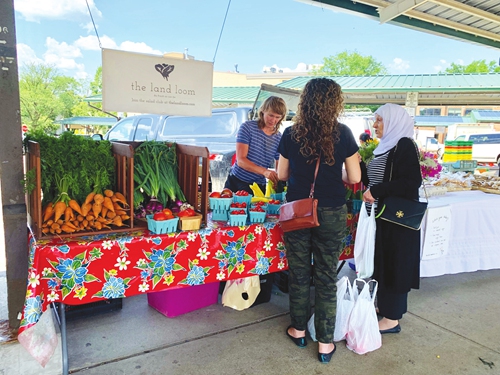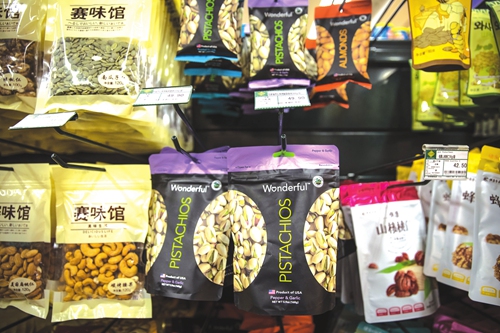HOME >> BUSINESS
We want our Chinese market back: US farmers
By Xinhua - Global Times Source:Xinhua-Global Times Published: 2019/11/18 19:23:39
Tariffs have led to excess produce and wobbly prices

View of a farmers market in Michigan, the US Photo: IC

US-imported products are seen in a store in Beijing in July 2018. Photo: IC
As the southern US state of Georgia enters the pecan harvest season, local growers are anxious instead of cheerful, faced with dim business prospects following the loss of their largest overseas market in China due to massive tariffs.
Randy Hudson, a pecan grower in Ocilla, Georgia, began harvesting the variety "Desirable" in mid-October.
The variety, known for its large, well-filled nuts sold at good prices, used to be a favorite of Chinese buyers. With fast shipment and proper processing, the "Desirable" nuts were usually fast sellers during the Chinese New Year shopping season.
This year, however, Hudson must look for domestic or alternate foreign buyers to receive his products.
After the US unilaterally imposed massive tariffs on Chinese imports last year, China added retaliatory tariffs on US goods, making pecans currently subject to around 47 percent tariffs, up from 7 percent in early 2018.
In 1999, Hudson brought the nuts to the Chinese market when Chinese consumers knew little about pecans native to the US and often confused them with walnuts.
But now, he and his fellow pecan growers and exporters, as well as their Chinese partners, have managed to grow the business in China, with an increasing number of consumers interested in the nut's health benefits.
Before the additional tariffs took effect, Hudson's company exported 10 to 20 million pounds (4,500 to 9,000 tons) of pecans every year, accounting for about 20 to 30 percent of Georgia's total annual pecan output.
To satisfy Chinese consumers' demands, the company used to buy pecans from other growers. China's market accounted for 90 percent of the company's total sales revenue.
However, increased tariffs are eroding Hudson's business expansion in China, costing him millions of dollars in losses, and losses of more than $10 million to the whole pecan industry.
"It's been very, very difficult to be able to balance our income with our expenses under the burden of the tariffs," said Hudson.
Call for trade deal
The north-central US state of Wisconsin boasts a century-long history of growing ginseng and makes up about 10 percent of the global ginseng output.
Some 70 to 80 percent of the state's annual output was exported to China, where ginseng roots are consumed both as medicine and food.
As the US-initiated trade war unfolded, tariffs imposed on US ginseng soared to about 50 percent - a nightmare for 2,000 ginseng producers in Wisconsin's Marathon County.
In the years before the trade war, all ginseng harvested in the previous year could sell out by March. In August this year, despite a discount, half of Wisconsin's ginseng produced last year was still in stock.
Though the US government has offered farmers $5,700 per acre (0.4 hectares) in subsidies, that is merely 10 percent of the cost of growing ginseng and thus helps very little, said Jiang Mingtao, a ginseng grower in Marathon.
Jiang, founder and president of Marathon Ginseng International, said that retail sales of ginseng decreased 30 percent this year in the county.
Likewise, pecan growers cannot rely on subsidies to make ends meet.
"We are waiting eagerly for a trade deal to be signed between China and the US, and we hope tariff reductions on ginseng will be included in the deal," Jiang told the Xinhua News Agency, adding that farmers are hoping for free and fair trade.
Lenny Wells, professor and extension horticulture specialist for pecans at the University of Georgia, said that the huge potential of the Chinese market once helped push up pecan prices.
However, the price of in-shell "Desirable" pecans dropped from $2.90 to $3.05 per pound (about 0.4 kilogram) to $2.15 to $2.40 per pound last year.
He said most growers hope to see China and the US reach a trade deal before long.
One concern is that if the disputes last for too long, China will forget about US pecans, Wells said. "We hope it's resolved sooner than later."
Janice Dees, executive director of the US Pecan Growers Council representing around 10,000 pecan growers, told Xinhua that the entire industry hopes that what is known as a "Phase One" trade deal between Beijing and Washington can bring good news for pecan growers.
She said the industry attaches importance to China. "We look forward to going back to doing business very soon."
Engagement with Chinese consumers
While calling for a trade deal, farmers have been maintaining contact with Chinese importers and consumers.
Jiang's partner from the eastern Chinese province of Zhejiang represented Marathon Ginseng International at the second China International Import Expo (CIIE) held in Shanghai from November 5 to 10.
By exhibiting wild ginseng and grown-ginseng gift boxes, cosmetics and liquor, among other products, the company was able to attract Chinese consumers and signed $300,000 worth of ginseng contracts.
Ellis Brothers Pecans Inc is a well-known US pecan grower, processor and retailer from the city of Vienna, Georgia. It has been working under the Georgia Grown project for over a year to sell its packaged shelled pecans on China's e-commerce platform JD.com.
With the help of the Georgia Grown project, a marketing and economic development program from the Georgia Department of Agriculture, Ellis Brothers and two other brands are now able to sell roughly 20 pecan products to Chinese consumers, including those flavored with sea salt, habanero BBQ, maple and Cajun.
Posted in: ECONOMY